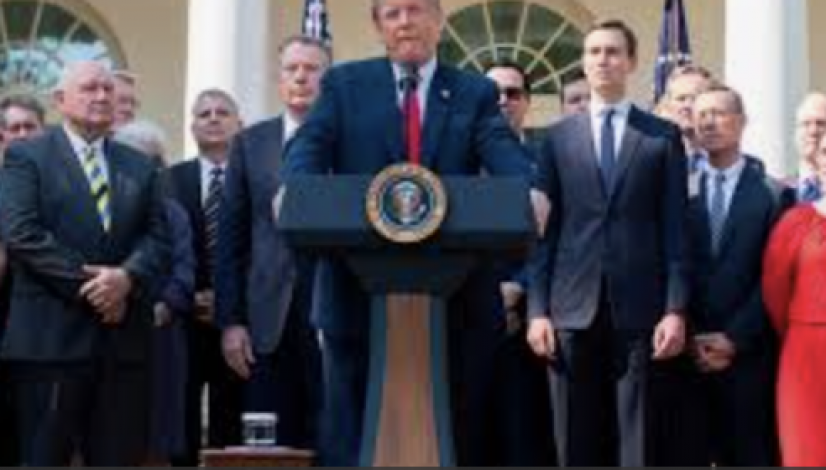Trump’s ‘America First’ policy scores a big win with new NAFTA deal

President Trump needed a win going into the midterm elections, and now he has a big one. Hours before the expiration of a deadline set by the White House, Canada concluded its testy negotiations and agreed to join the U.S. and Mexico in the rewrite of the North American Free Trade Agreement (NAFTA).
Though Canadian Prime Minister Justin Trudeau had resisted giving in to numerous demands laid out by U.S. Trade Representative Robert Lighthizer, Ottawa finally came to terms, presumably deciding that it could not suffer the economic pummeling that would follow the demise of the 25-year pact with its largest trading partner.
Nor could Trudeau withstand the political hit his Liberal Party would invariably have taken.
Though Canada’s young prime minister enjoyed a polling surge after he pushed back against President Trump’s comments that he was “weak” and “dishonest” at the Group of Seven meeting held earlier this year in Quebec, it was clear that declining to join a revised NAFTA could have been political suicide for Trudeau.
Trudeau faces elections in 2019, and the demise of NAFTA would have shaken Canada’s export-heavy economy. Already, the country’s growth has faltered modestly because of the uncertainty surrounding the trade talks.
The National Bank of Canada recently trimmed their forecast of 2018 GDP growth to from 2.2 percent to 2.0 percent, citing trade worries.
It could have gotten worse. This past summer, Trump upped the stakes on Canada, threatening to impose tariffs on automobiles coming in from our northern neighbor. The possible damage from a 25-percent tariff on car imports was described as “catastrophic” for Canada, with some projecting well over 100,000 lost jobs.
The Royal Bank of Canada stated in its recent economic update, “Tariffs on production and an assumed decline in auto sales activity would generate an estimated 0.5[percentage point] hit to the economy. Adding on sectors indirectly impacted, could more than double the hit to the economy’s growth rate.”
The threat of car tariffs increased the pressure, as did Trump’s apparent readiness to move forward with a bilateral agreement with Mexico, despite resistance from Congress.
The new NAFTA, which will be called the U.S.-Mexico-Canada Agreement (USMCA), secured some advantages for the U.S. while also giving in to certain Canadian priorities. As in the pact with Mexico, the U.S. insisted that a greater portion of cars sold in the U.S. be produced in the U.S. (75 percent, up from 62.5 percent) and also won some concessions allowing greater poultry and dairy imports.
The latter issue was especially contentious, since Quebec, which is home to a good part of Canada’s agriculture industry and fiercely protective of its dairy farmers, is politically up for grabs in the elections currently underway.
Trudeau’s Liberal Party, which has reigned in the province for 15 years, is threatened by an upstart party which has never been in power. Immigration is a big issue, but trade follows close behind.
Canada’s tariffs on dairy imports of roughly 270 percent have been called out by President Trump as unfair and were targeted throughout the negotiations.
Ottawa gets a win on maintaining the special dispute resolution process, which has helped it win trade disagreements (like that governing softwood lumber imports) against the U.S.
More broadly, the new NAFTA shows the world that the Trump White House may succeed in bringing home better trade pacts. It was, many think, time for a win.
With the midterm elections approaching and with some forecasting that the trade war with China will slow our booming economy, President Trump needed to show voters, especially those in states like Michigan and Wisconsin, that his tactics could succeed.
Trade, of course, is just one arena in which President Trump has upended convention. Critics like to portray Trump as a political wrecking ball, challenging diplomatic and commercial norms for little purpose and bullying allies and foes alike in dangerous and injurious ways.
Supporters, on the other hand, see his many confrontations as confirming his “American First” program in which his administration is working to reset relations in ways that are fairer to the U.S.
For decades, the United States has been the willing underwriter of friends and foes, propping up the world’s institutions and bankrolling peace initiatives in the far reaches of the globe.
Trump’s demands that other nations pull their weight on funding the North Atlantic Treaty Organization (NATO) or his decision to exit the hostile U.N. Human Rights Council strike many as overdue.
We are a wealthy nation, but so are Germany, Belgium and the Netherlands, which all underspend on their NATO military commitments. Many Americans think it is high time those countries and others step up.
The idea that the WTO allows China to impose outsized tariffs on imports and shirk its international commitments because it is a “developing” nation is absurd, but these vast global organizations can take decades to adjust to emerging economic realities. Trump is impatient, and he wants change now.
His long-time impatience with the outdated NAFTA treaty is well known. He has not been alone; labor leaders have railed against the job losses that followed from the pact.
When President Clinton signed the deal in 1993, he promised that NAFTA would lead to an “export boom to Mexico,” creating 200,000 jobs in two years and a million jobs in five years.
The left-leaning Economic Policy Institute reported in 2013, “By 2010, trade deficits with Mexico had eliminated 682,900 good U.S. jobs, most (60.8 percent) in manufacturing.”
Many disagree with that assessment, but also think the trade deal needed more than a cosmetic facelift. Thanks to persistent pressure from the Trump White House, it just got one.
Published on The Hill




